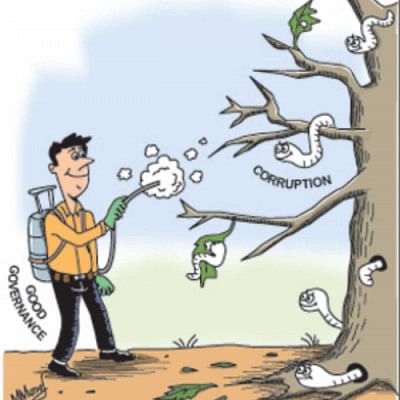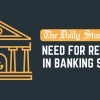Can Bangladesh continue to grow without 'good governance'?

If we look at the growth pattern of Bangladesh from 1990, we discover two specific characteristics: first, the growth rate has been on the rise, and second, it is less volatile compared to those of many other countries (for example, India, Vietnam, Cambodia, China, Malaysia, Thailand and Ghana) which are known as 'high growth performing countries'. Bangladesh's growth experience has often been termed as the 'Bangladesh paradox' given that the country has been able to perform well despite 'weak governance'. Now, the big question is: can Bangladesh continue to grow without 'good governance'? If we look over the last three decades, obviously, Bangladesh had been growing without the so-called 'good governance'. Then what does this 'good governance' mean?
Four contemporary analytical approaches can be linked to the discussion on 'good governance'. The new institutional economics (contemporary lead presenters are Daron Acemoglu and James Robinson), representing a variant of the neo-liberal orthodoxy, argue for specific and well-defined rules and property right systems ('good governance') for economic growth. There are three alternative approaches to this new institutional economics. The approach by Douglass North, Joseph Wallis and Barry Weingast argues for 'limited access order' in a large number of developing countries in contrast to 'open access order' in advanced economies. In 'limited access orders', political elites divide up control of the economy, each getting some share of the rents; and since outbreaks of 'violence' (conflicts among the elites) reduce the rents, the elite groups have incentives to reduce conflicts among them. The approach by Mushtaq Khan stresses on 'political settlement', which highlights on the relative holding of the power of different groups and organisations contesting the distribution of resources, and a 'political settlement' emerges when the distribution of benefits supported by its institutions is consistent with the distribution of power in society. Mushtaq Khan also emphasises on 'growth-enhancing governance' (un-orthodox institutional arrangements) in contrast to 'market-enhancing governance' (orthodox institutional arrangements, as signified by new institutional economics). Finally, the approach by Lant Pritchett, Kunal Sen, and Eric Werker emphasises on 'deals space', 'rents space' and 'political settlements' for growth acceleration and growth maintenance in developing countries. The rents space is characterised by private sector firms who can be rentiers (securing rent from the export of natural resources), powerbrokers (securing rent from the regulated domestic market), magicians (firms participate in competitive export markets), and workhorses (firms participate in unregulated domestic markets). Deals, in contrast to rules, among the political and economic elites, can be open (access is open to all) or closed (access is restricted); and also they can be ordered (deals are respected) or disordered (deals are not respected). The countries are likely to exhibit high growth when deals are open and ordered.
Can we explain the growth experience of Bangladesh through these four approaches? The approach by new institutional economics cannot explain the growth of Bangladesh since the country never had the so-called 'good governance' but the economy continued to grow. Furthermore, all these approaches have three major problems. First, approaches of 'limited access order' and 'political settlement' emphasise more on the 'elite agreement' at the macro level, thus ignore the perspectives at the sectoral level. However, the 'deals-rent space' approach has a better holding on the sectoral level analysis. Second, all these approaches emphasise on the process of 'elite agreement' rather than on the outcome, which does not convincingly show how such processes affects economic growth. Third and most importantly, all these approaches emphasise on 'elite agreement' and overlook the critical nexus between elites and non-elites within society. Only in 'limited access order' approach, such nexus is shown through the 'power of violence' of non-elites.
Empirical research suggests that there are four major drivers of growth in Bangladesh: exports of readymade garments (RMG), remittances, growth in agriculture, and microfinance. Now, it is clear that we cannot explain these growth drivers of Bangladesh with the usual definition of governance or politics by the aforementioned four approaches.
From a political economy perspective, in my view, there must be some substances by which these growth drivers are fuelled; and I want to name these substances as 'political capital'. The usual meaning of 'political capital' is a feeling of trust that politicians build among the common people through which they exert their influence in society. But, in my opinion, 'political capital' is an outcome of agreements among the political elites and support from the non-elites on such agreements over certain growth drivers in the economy. In order to source such support, elites ensure some critical benefits for non-elites. Over the last three decades, Bangladesh has been able to generate crucial stock and flow of 'political capital' in favour of the aforementioned growth drivers. Bangladesh is not rich in natural resources, which did not help to generate substantial rents for the political elites. Elites, thus, found the RMG sector as a source of generation of rents, and they were able to draw support from the non-elite through the creation of large-scale employment opportunities in the RMG sector. In the case of remittances, international migration of a large number of people helped alleviation of poverty, and thus gathered support from the non-elites. For the agricultural sector, this 'political capital' is generated from the experience of the 1974 famine, as the political elites realised that a country like Bangladesh cannot afford anything like this in future. Therefore, subsequent governments focused on the development of the agricultural sector to ensure food security. Finally, as microfinance, another example of elite and non-elite nexus, played important roles in generating growth and alleviating poverty in Bangladesh, there had been a construction of significant stock of 'political capital' around microfinance over the last three decades.
Therefore, Bangladesh can continue to grow until the 'political capital' provides returns over the existing drivers of growth. Given the fact that there are growing challenges for these existing drivers, political elites in Bangladesh also need to find new drivers for growth acceleration. There are two new prospective drivers, for which critical 'political capital' is yet to be formed. The first one relates to the comprehensive economic and trade integration with neighbouring countries, and the second one is government's initiative of setting up 100 special economic zones (SEZs) by 2030 for rapid industrialisation of the country through large-scale domestic and foreign investments. It is high time that political elites in Bangladesh come out from their comfort zone of old drivers towards the journey of building 'political capital' for new drivers.
The writer is Professor of Department of Economics, University of Dhaka, Bangladesh, and Executive Director, South Asian Network on Economic Modeling (SANEM).
E-mail: [email protected]

 For all latest news, follow The Daily Star's Google News channel.
For all latest news, follow The Daily Star's Google News channel. 








Comments